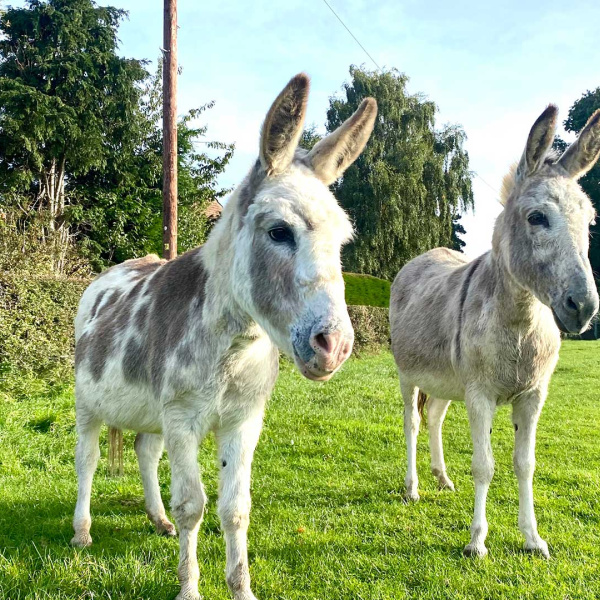The RSPCA and The Donkey Sanctuary found two donkeys and a mule were being kept in an unsuitable environment without adequate water or dental and farrier care.
A mother and son have been sentenced for a number of animal welfare offences in relation to two donkeys and a mule which were kept in unsuitable conditions.
Susan Alison Shears, (DOB 22/10/1947) of Gowdall, Goole was found guilty after a trial hearing at Beverley Magistrates’ Court on 3 August of seven offences relating to two donkeys called Dora and Daisy and a mule called Ebony.
Her son, John Shears, (DOB 13/04/1982) of Rawcliffe, Goole pleaded guilty to four animal welfare offences relating to the same animals at the start of the trial.
Sentencing took place at Hull Magistrates’ Court on Monday (October 11).
The court heard how inspectors from the RSPCA and welfare advisers from The Donkey Sanctuary had previously offered help to the Shears and advised of the actions needed to safeguard the welfare of the animals but this was ignored and the situation remained unchanged.
Dora, Daisy and Ebony were kept in a field full of ragwort - a plant that is toxic to equines. The field was also littered with loose barbed wire and fallen wire netting which posed risk of injury or entanglement as well as other hazards.
An old, disused work container which the animals had access to was completely unsuitable as a shelter - it was too small and had sharp edges and canvas straps still attached inside which the animals could have become caught on.
The animals also did not have access to any hard standing within their living environment. It’s important for all donkeys to have access to hard standing to protect their feet from wet and muddy conditions and to prevent infections.
Their water supply was wholly inadequate and dirty with an accumulation of algae.
All three animals had overgrown teeth and hooves and were in need of dental and farrier treatment.
RSPCA Inspector Thomas Hutton, who led the investigation for the animal welfare charity said: “Police forced entry to the field using bolt cutters and gave permission for myself, staff from The Donkey Sanctuary and an independent vet to enter the field and examine the animals and their environment.
“An independent vet examined each animal and found Dora was suffering from laminitis and Ebony was suffering from ulceration to the soft tissues of her mouth from inadequate dental care that would have caused her discomfort when eating. She advised the animals should be removed from the site as they were either suffering or likely to suffer if they remained. Police took the animals into possession, passing them into the RSPCA’s care.”
The animals were transported to a near-by holding base funded by The Donkey Sanctuary, where they received urgent dental and farrier treatment.
Alongside the lifetime disqualification from keeping equines, which cannot be appealed for 10 years, Susan Shears was sentenced to 20 weeks’ imprisonment, suspended for two years and ordered to pay £3,000 costs.
John Shears was disqualified from keeping equines for 10 years, which cannot be appealed for five years and was sentenced to 12 weeks’ imprisonment, suspended for 18 months and ordered to pay £700 costs.
Following the sentencing hearing, Inspector Hutton said, “Pet owners have a legal responsibility to ensure their animals do not suffer and that their needs are met. Despite advice from The Donkey Sanctuary, sadly the Shears failed in their duty towards their animals”.
Hannah Bryer, Head of Welfare at The Donkey Sanctuary added: “Owning donkeys and mules is a hugely rewarding experience and a wonderful privilege, however they require caring and compassionate management to ensure they lead healthy and enriched lives.
“We had previously attended this location alongside the RSPCA and engaged with the owners regarding Ebony and another donkey. We discussed the changes that needed to be made to ensure the environment was safe and suitable for the animals.
“On a repeat visit, we found Ebony with Daisy and Dora living at the same location that was detrimental to their welfare, it was clear our advice had not been followed. We worked with the RSPCA to safeguard their welfare.”
Sadly, Ebony was put to sleep on veterinary advice due to her on-going suffering from her dental issues. Dora and Daisy have responded well to treatment, but due to their age and on-going care needs they may need to remain in The Donkey Sanctuary care for the rest of their lives.
At the sentencing hearing, the court issued a deprivation order for the ownership of the donkeys to be handed over to the RSPCA. The defendants have 21 days to appeal this. After the 21 days and subject to no appeals, the care of the animals will be handed over to The Donkey Sanctuary.
For interviews, images and information please contact The Donkey Sanctuary press office on 01395 573124 or 07870 849563 (including out of hours) or send an email.
The Donkey Sanctuary is the world's largest equine welfare charity. Our vision is a world where donkeys and mules live free from suffering and their contribution to humanity is fully valued. We run 10 sanctuaries around the UK and Europe, giving lifelong care to more than 7,000 donkeys and mules. Our hospital treats sick donkeys and trains vets both nationwide and worldwide. Our donkey-facilitated learning programme helps vulnerable children and adults develop life skills by connecting with donkeys on an emotional and physical level. The charity operates programmes worldwide for animals working in agriculture, industry and transportation, and those used in the production of meat and skin.
Please note that the name ‘The Donkey Sanctuary’ should not be abbreviated to ‘Donkey Sanctuary’, and the word ‘The’ should always appear with a capital ‘T’ as above.
